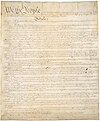United States Law

|
United States Law Learning Project
part of the School of Law
|

|
Welcome
A very warm welcome to the United States Law Learning Project! The legal system of the United States of America is a complex one with two major levels, namely the federal and state levels. The training of lawyers is controlled by the American Bar Association (ABA). Lawyers advise their clients on legal matters including writing contracts, interpreting the law, and representing them in court.
Another aspect of US law is that it also split into civil and criminal law. Both may involve courts, but the rules are different. In a court trial, criminal cases are more likely to involve juries than civil cases. There are two basic differences between civil and criminal cases:
- Civil cases are decided on the weight of the evidence. Criminal cases require proof beyond reasonable doubt.
- Civil cases involving a jury require a majority. Criminal cases require a unanimous decision.
An example of the difference between the two is the civil suit brought against the Federal Bureau of Investigation (FBI) for their role in the assassination of Martin Luther King, Jr.: the family succeeded because a majority of the jurors concluded that the weight of the evidence favored the family. A criminal procedure did not come to trial, presumably because the prosecutors felt that the evidence was not sufficient to obtain a unanimous judgment beyond reasonable doubt that certain FBI agents were complicit.[1]
Any questions about following the US Constitution can be presented to the Supreme Court whose nine judges can deem a law or action unconstitutional. If deemed such it is impossible to reinstated unless the Supreme Court revokes its judgement or it is overturned by a subsequent constitutional amendment.
This Project focusses on US Law and covers topics at a college level but it is not a formal qualification. The Project is designed to provide an informal learning experience, which may provide knowledge and skills that can be used elsewhere.
The Project comprises a number of units, each of which covers a separate area of US Law. As tempting as it might be to compare this with the structure of a formal law degree, Wikiversity does not allocate "credits" or "points" to any of the units. Each unit contains a number of smaller subunits and is designed to be studied alongside a relevant textbook from Wikibooks, one of the partner websites of Wikiversity. The links for the textbooks can be found at the start of each unit. Each unit outline will also list additional recommended texts, articles and other materials, which are not compulsory but intended for deeper independent study. Throughout each unit there will be opportunities in the form of quizzes and short essays to enable you to reflect on the material and see how much you understand. There is a larger quiz at the end of the unit, which you can repeat as any times as you wish until you are confident of your understanding of the material. Additionally, there are a number of case studies and suggested essays to complement your studies as well as recommendations for further reading.
Project summary
- Project code: United States Law
- Prerequisites: None
- Time investment: 1 calendar year
- Assessment suggestions:
- A series of quizzes in lieu of examinations on various aspects of United States Law including relevant case law: 40%
- A series of detailed essays written as journal articles for peer-reviewing: 40%
- A multi-part personal development portfolio: 20%
- Portal: Humanities
- School: Law
- Level: Introductory—Advanced
Content summary
- In this Learning Project, participants will learn about the history and development of United States Law from the 18th century to the modern era, with a particular focus on areas that are usually part of law degrees.
- One of the goals of this project is to utilise free materials, so the learner does not have to pay expensive subscriptions. This will be achieved by the use of a series of free textbooks (from Wikibooks), original source material for statutes and cases, a series of Wikiversity Law Reports, the development of a Wikiversity Law Review, quizzes and other freely available resources.
- It will be noted that purely academic study is insufficient in preparing for legal practice and thus there will be suggested tools to enable some of these aspects. The limitations of online courses like this inhibit more active participation such as the classical skill of moot court but there will be recommendations for overcoming these obstacles.
Goals
- Study and understand the origins of United States Law;
- Examine the current state of United States Law;
- Suggest tools and methods for participants to improve their practical skills.
Resources
Notes
- ↑ Pepper, William F. (1995). Orders to Kill: The truth behind the murder of Martin Luther King, Jr.. Warner Books. ISBN 0-446-67394-3.
